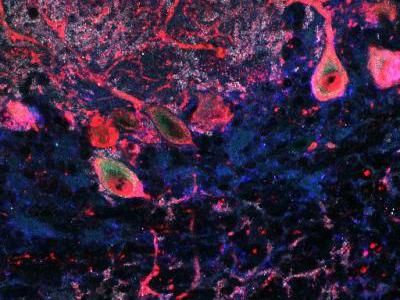Sniffing women’s tears reduces aggressive behavior in men
Exposure to tears led to less revenge-seeking behavior and lower aggression-related brain activity
New research, publishing December 21st in the open access journal in PLOS Biology, shows that tears from women contain chemicals that block aggression in men. The study led by Shani Agron at the Weizmann Institute of Science, Israel, finds that sniffing tears leads to reduced brain activity related to aggression, which results is less aggressive behavior.

Symbolic image
Computer-generated image
Male aggression in rodents is known to be blocked when they smell female tears. This is an example of social chemosignaling, a process that is common in animals but less common—or less understood—in humans. To determine whether tears have the same affect in people, the researchers exposed a group of men to either women’s emotional tears or saline while they played a two-person game. The game was designed to elicit aggressive behavior against the other player, whom the men were led to believe was cheating. When given the opportunity, the men could get revenge on the other player by causing them lose money. The men did not know what they were sniffing and could not distinguish between the tears or the saline, which were both odorless.
Revenge-seeking aggressive behavior during the game dropped more than 40% after the men sniffed women’s emotional tears. When repeated in an MRI scanner, functional imaging showed two aggression-related brain regions—the prefrontal cortex and anterior insula—that became more active when the men were provoked during the game, but did not become as active in the same situations when the men were sniffing the tears. Individually, the greater the difference in this brain activity, the less often the player took revenge during the game. Finding this link between tears, brain activity, and aggressive behavior implies that social chemosignaling is a factor in human aggression, not simply an animal curiosity.
The authors add, “We found that just like in mice, human tears contain a chemical signal that blocks conspecific male aggression. This goes against the notion that emotional tears are uniquely human.”
Original publication
Other news from the department science

Get the life science industry in your inbox
By submitting this form you agree that LUMITOS AG will send you the newsletter(s) selected above by email. Your data will not be passed on to third parties. Your data will be stored and processed in accordance with our data protection regulations. LUMITOS may contact you by email for the purpose of advertising or market and opinion surveys. You can revoke your consent at any time without giving reasons to LUMITOS AG, Ernst-Augustin-Str. 2, 12489 Berlin, Germany or by e-mail at revoke@lumitos.com with effect for the future. In addition, each email contains a link to unsubscribe from the corresponding newsletter.





















































